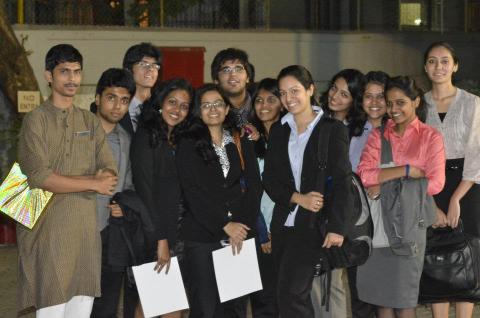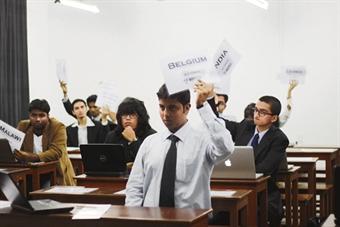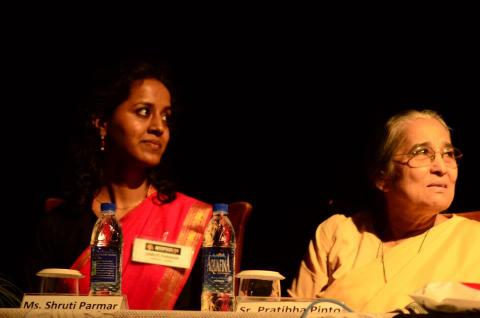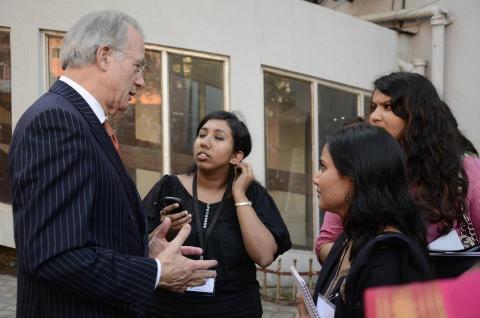



'MUNSOPHICAL 2011- Ideas for a Better World' was the first Model United Nations Conference (MUN) held at Sophia College for Women, Mumbai (India), on December 9-11, 2011, in collaboration with the United Nations Information Centre for India and Bhutan. The theme of this event was 'Education for Justice, Peace and the Integrity of Nature with a Special Focus on Human Rights'.
This initiative by the College's International Relations Club brought together some of the most brilliant students from a large number of schools and colleges from all over India as Delegates of the UN member nations to address critical global issues such as 'Climate Change: A Threat to International Peace and Security', 'Protection and Preservation of the Human Rights of Women and Children in Conflict Zones' and 'Ensuring Food Security and Tackling the Global Food Crisis'. This National Conference also simulated for the first time ever 'A Joint Session of the African Union and the Organization of Islamic Cooperation' deriving lessons from the recent Arab Spring.
The event was honored by the presence of the Mayor of The Hague, Jozias van Aartsen, as the Chief Guest at the Inaugural function. In his opening speech, Mr. van Aartsen urged that peace needed to be waged as deliberately and energetically as war. He spoke of young people as “holding the future” and being “vectors of justice and peace,” and he was happy to see them trying to understand the mechanism of the United Nations (UN). He said the most important skill to work in the UN was: “To listen carefully and be able to guess what was not said,” but also to, “Reach goals in a diplomatic way.” His graciousness and warmth charmed all who were present, especially those who had the opportunity to interact with him more informally after the function.
The next two days were filled with activity as students engaged passionately with the topics under discussion and the organizing team moved from venue to venue in the College to ensure that events moved smoothly. All the long months of planning, preparation and consistent hard work under the leadership of Conference Secretary General Shruti Parmar, whose vision, initiative and organizational skills were the cornerstones of the conference, certainly paid off as the programme unfolded.
Resource persons included the noted environmentalist, Mr. Bittu Sahgal; banker-politician, Ms Meera Sanyal; and Prof. Ilina Sen, from the field of Women’s Studies. A day-long workshop on International Relations, Diplomacy and Conflict Resolution, the Role of the United Nations, Model UN and the current global scenario was also conducted for school and college students by Prof. Kishu Daswani, Ambassador Rajendra Abhyankar and others. The programme culminated in an address by the famous activist, Dr. Binayak Sen.
Some responses from participants include:
• “Ultimately MUNSOPHICAL 2011 has been one team effort which will raise the bar for everything Sophia College undertakes in the future. I see with this as a start of a new tradition. As a humanities college we have become a benchmark – A Model UN is one of the most intellectually stimulating activities a college can undertake.”
• “The event was extraordinarily managed by the Sophia team. Every detail was executed with a high degree of professionalism by all teams: from the hospitality squad to the Secretariat.”
Sr. Anila Verghese rscj, principal of Sophia College, spoke of the relevance of topics discussed. “Education for justice, peace and the integrity of nature focusing on human rights have become, increasingly, serious concerns that need to be addressed. The idea behind conducting such an event is to ensure that young citizens engage in active discussions on key issues affecting us.”
Model UN is a concept that facilitates the interaction between students across borders. Not only does it encourage them to debate over global concerns, one can also see them spread awareness in order to equip the world for a better tomorrow.
Ananda Amritmahal, rscj
Province of India

